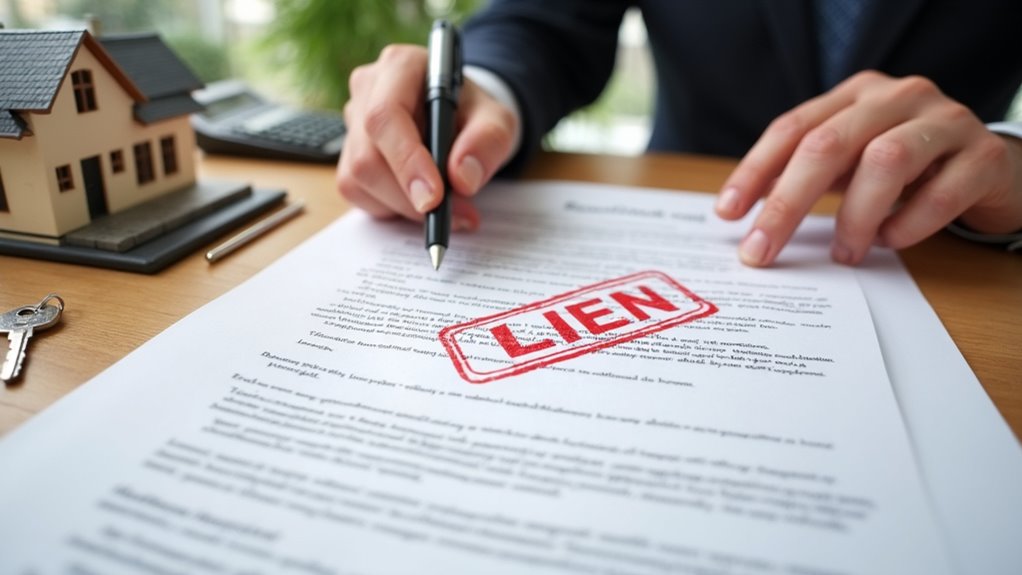Selling your house should be simple, but discovering a lien can quickly complicate things. Liens put your sale on hold until you address them. Buyers and lenders will not move forward unless the title is clear.
This obstacle can feel stressful and overwhelming. Liens may delay your timeline, cost more money, and even scare off buyers. If you do not handle them quickly, you risk losing your sale.
You can negotiate lien payoffs by contacting lienholders, understanding your debt, and working out a settlement that satisfies all parties.
Knowing what to say and what paperwork to gather will help you close the sale faster. This blog will guide you through each step so you can resolve liens and sell your house smoothly.
Key Takeaways
- Request a written payoff statement from the lienholder to confirm the exact amount owed and any related fees.
- Verify the lien’s validity and accuracy by reviewing documentation and comparing with public records.
- Demonstrate financial hardship or urgency to negotiate reduced payoff amounts, waived penalties, or payment plans.
- Secure any negotiated agreements in writing, signed by both parties, to ensure enforceability.
- Coordinate with title or escrow professionals to ensure timely lien clearance and prevent closing delays.
Understanding What a Lien Is

A lien is a legal claim on your property. It is often used as security for a debt or duty. If you want to sell your home, a lien can slow or stop the sale.
Buyers may avoid homes with liens or offer less money. The lien must be paid before the property title is clear. An unresolved lien can lower your home’s value. Many sellers choose all-cash offers from local buyers to resolve liens and speed up closing.
You should check for any liens early in the selling process. Lenders, contractors, or the government may place liens for unpaid bills or taxes. If you resolve liens before selling, the process will be easier.
Always review your title report for liens. If you have questions, ask a real estate professional for help. This can help you avoid surprises during the sale.
Many home sellers in O’Fallon benefit from working with cash home buyers who can handle liens quickly and simplify the sale process.
Identifying the Types of Liens on Your Property
First, you’ll need to identify which types of liens are attached to your property, such as tax liens, mechanic’s liens, or judgment liens. Check public records at your county recorder’s office or use online databases to compile a complete list.
Always verify each lien’s validity by confirming details like recording dates and outstanding amounts before starting negotiations. Keep in mind that state-specific disclosure requirements around liens or property issues may apply, making it essential to understand your legal obligations before proceeding. If you are selling a property with a land contract, be sure to review the contract for any additional restrictions or requirements related to liens.
Common Property Lien Types
You can find out which liens affect your property by knowing the common types. A mortgage lien is the most usual, placed by your lender until the loan is paid. Tax liens happen if you fail to pay property taxes.
An HOA lien can be filed if you owe dues to your homeowners association. Mechanic’s liens come from unpaid contractors for work done on your home. Judgment liens may appear if a court orders you to pay a creditor.
If you are selling your home, check for these liens before closing. Identifying them early helps you avoid delays. Clearing liens is important to transfer ownership smoothly.
Researching Public Records
To find out what liens are on your property, check public records. Visit your county recorder’s office or use their online website. Search with your property’s legal description or parcel number.
Public records will show all recorded liens, like mortgages and tax liens. If you see a lien, note its type, date, and the creditor’s name. Always check the amount owed for each lien.
Do not rely only on title company reports for this information. Cross-check details from different sources to be sure they are correct. If you review all public records carefully, you will know what encumbrances affect your property’s value and sale.
Verifying Lien Validity
Not all liens listed in public records are valid or enforceable. You should always check if each lien is legitimate before paying. If a lien is not valid, you may not need to pay it.
Request lien documents from the creditor to confirm the debt details. Look at the debt amount, recording date, and property description. If you find mistakes or old liens, they might not be enforceable.
Knowing the lien type helps you plan your next steps. Mortgage, tax, mechanic’s, and judgment liens each have different rules. If the lien affects marketability, you may need to address it before selling.
Check how each lien affects your home’s value. A market analysis can show if buyers will worry about any liens. If you confirm each lien’s validity and type, you can negotiate better and avoid unnecessary payments.
How Liens Affect the Home Selling Process
Liens make selling a home more difficult. These legal claims must be paid off before you can transfer ownership. If a lien exists, it may slow or block the sale. Capital gains tax may also become a factor if you sell your main home, but primary residence exclusion can help reduce your tax burden if certain requirements are met.
Buyers often avoid homes with liens because of extra costs or legal risks. This can reduce the number of interested buyers. A property with liens may also have a lower appraised value.
If you have liens, the closing process could be delayed. You may need to change the sale terms or lower your price. In a slow market, even small liens could cause buyers to walk away.
You should try to fix lien issues early. Resolving liens before listing your home can keep the sale process smooth. If you cannot clear them quickly, be ready to negotiate with buyers.
If liens force you into selling under difficult circumstances, you might consider selling the house as-is, which allows you to avoid making repairs or updates before closing.
Finding Out if Your House Has Any Liens

To find out if your house has any liens, check public records for your property. You can visit your county recorder’s office or contact a title company. These sources will show any liens, such as tax or judgment liens. You should also review your latest property appraisal and market analysis.
These documents might mention liens that affect your home’s value. If they do not, a title report is the best way to confirm. Examine your mortgage statement and any letters from creditors. These may mention unpaid debts or liens. If you find any liens, address them before selling your home. Knowing about liens early gives you more flexibility to work with local real estate market experts who can help you resolve these issues efficiently.
If you discover a lien early, it helps you plan better. You will know your true home equity. This can prevent problems when you negotiate or close the sale. Working with a trusted local title company can help ensure all liens are found and addressed before closing.
Contacting the Lienholder for Details
Contact the lienholder as soon as you find a lien on your property. Request the full payoff amount and confirm all lien details. Always ask for a written payoff statement to see the exact amount needed to clear the lien.
Check if the lien’s legal description matches your property records. This step helps prevent future disputes about ownership or boundaries. If there is any mismatch, ask the lienholder for clarification.
Consider how the outstanding lien might affect your property value. Buyers and their lenders will look at these details closely. You may need to adjust your price or negotiate with the buyer. It’s helpful to understand how zero fees or commissions can make your net proceeds more predictable when negotiating lien payoffs.
When you call or write to the lienholder, have your property’s address and legal description ready. Provide proof that you own the property. Request a current payoff statement in writing and ask how long it will take to process the lien release.
Clear and quick communication gives you accurate information. This helps you prepare for negotiations and ensures a smooth sale or refinance. If you’re selling to a family-owned local business, they can often assist with escrow details and help you navigate lien payoffs for a faster closing.
Assessing the Amount Owed and Validity of the Lien

Request an official lien statement from the lienholder to confirm the exact payoff amount and any accrued interest or fees. Verify that the party claiming the lien has legal authority to enforce it by reviewing supporting documentation and credentials. Scrutinize all paperwork for discrepancies or errors that could affect the payoff calculation or the lien’s enforceability.
In situations involving multiple owners on the deed, coordinating lien payoffs may require additional legal and financial considerations to ensure all parties’ interests are properly addressed. When selling in Florissant, working with trusted local cash buyers can streamline the payoff process and provide guidance on handling liens efficiently.
Obtaining Official Lien Statements
To start lien negotiations, you must get an official lien statement from the lienholder. This document shows the exact amount you owe, including any fees. If you do not have this statement, you cannot know your true financial responsibility.
The official statement helps confirm the lien is real and accurate. It also ensures there are no extra or unauthorized charges. Always ask for the most recent statement to get current figures.
Carefully check the statement for the following details: remaining principal, interest, late fees, and legal charges. If you find any errors, you can use the statement to dispute them. If penalties apply for early or late payoff, these should also appear on the statement.
Verifying Lienholder Authorization
To be sure a lienholder can collect a debt, always check their legal right first. Confirm who they are and if they have the authority. If you skip this step, you risk paying the wrong party.
For property tax liens, contact your local tax assessor’s office directly. Only this office can enforce these debts. Never rely on third parties for this information.
If you deal with a mechanic’s lien, ask for original contracts or work orders. Make sure the contractor recorded the lien with your county. If they cannot show proof, do not pay them.
Request an official payoff statement on company letterhead in every case. Compare the amount owed with public records. Written documents protect you from incorrect or fake demands.
Identifying Discrepancies in Documentation
Discrepancies in documentation are common when dealing with payoff statements. Always review each payoff statement carefully before trusting the figures. If you skip this step, you could lose money or face title issues.
You should compare the payoff amount to your own records. Check that all itemized fees match your loan agreement. Make sure the lienholder is legally allowed to claim the debt.
All payments you made must appear correctly on the statement. If you find a mistake, ask for proof or a corrected statement. Only move forward once all errors are resolved.
Exploring Your Options for Paying Off Liens

If you have a lien, there are a few ways to pay it off. You can use money from selling your home to clear the lien at closing. This makes sure the new owner gets a title without problems. Working with local investors who understand the West County real estate market can help ensure the process is smooth and you receive a fair cash offer for your property.
If selling is not possible, selling other assets or getting a short-term loan might help. Some people use their savings or borrow from family. Always check which lien has to be paid first, as property tax liens often take priority.
Talking to a tax expert is important if you plan to settle for less than you owe. Sometimes, forgiven debt counts as taxable income. Make sure you know how each choice affects your credit and finances before deciding. If you want to skip the hassle, you can work with a local cash buyer who handles all lien payoffs and closing details, making the process stress-free.
Negotiating the Payoff Amount With Lienholders
Negotiating the payoff amount with lienholders means working to lower what you owe. You need to know the lienholder’s rules and your own finances. This helps you reach a fair agreement.
You should first ask for a payoff statement. Carefully check all listed fees and interest charges. If you face hardship or need to sell, mention this with proof.
You can show you want to settle the debt soon. If possible, use examples of similar settlements or current market facts. You may request lower penalties or interest, or suggest a payment plan.
Always stay calm and polite during talks. If you are persistent, you may get a lower payoff amount. This will help you get the lien released and sell your home faster. Some buyers, such as trusted cash home buyers, can offer solutions that speed up the process and work with lienholders directly to help you close quickly.
Documenting All Agreements in Writing

Always put any agreement with a lienholder in writing. Written agreements protect you if there are future problems. Never rely on spoken promises alone.
Ask for a formal payoff statement. It should list the exact amount, payment deadline, and any special terms. Both parties must sign the document.
Keep a copy of the signed agreement for your records. Request that the lienholder provides a lien release after payment. If you do not document everything, you may face delays or other issues during your home sale.
Working With Title Companies and Escrow Agents
Title companies and escrow agents help manage the lien payoff process when you sell your home. They check all liens and handle money safely. If you use them, you lower the risk of mistakes or disputes.
These professionals complete title inspections to find any debts or claims. They make sure property details are honest and complete. If anything is missing, they will alert you.
Title companies request the exact payoff amounts from lienholders. Escrow agents securely pay the correct parties and confirm all liens are cleared. Their work helps ensure a smooth sale. If you want legal protection, you should use these experts. Their careful process gives you peace of mind.
Timing Lien Payoffs With the Closing Process
You must time lien payoffs carefully to ensure you can transfer a clear title. Get a current payoff statement from each lienholder. Make sure the payoff amount is accurate for your planned closing date.
If the closing date changes, the payoff amount may change because of added interest or fees. Always check for updates before closing. Watch market trends since property values can affect your negotiations.
Work closely with your title company and escrow agent to schedule payments. Funds should be sent to lienholders as soon as closing happens. Confirm that the lien release will be recorded quickly to prevent any issues after closing.
What to Do if a Lienholder Refuses to Negotiate
If a lienholder won’t negotiate, you still have strategic options. You can investigate legal remedies, engage mediation services, or evaluate debt settlement as alternative solutions. Assess each route carefully to protect your financial interests and ensure a successful transaction.
Exploring Legal Remedies
Legal remedies are available if a lienholder ignores or refuses settlement offers. You can use the law to protect your rights. Several actions may help resolve the dispute.
You may file a declaratory judgment action. This asks the court to decide if the lien is valid or how much it is worth. If you win, the lienholder must accept the court’s decision.
Another option is a quiet title lawsuit. This removes invalid or wrongly filed liens from your property’s title. If the court agrees, the lien will be cleared.
A lawyer can send a demand letter to the lienholder. This letter requests action and warns about possible legal steps. Sometimes, this prompts the lienholder to respond.
You should also review state laws about liens. If the lienholder missed deadlines or broke rules, you may have grounds to challenge the lien. These steps can force the lienholder to negotiate with you.
Seeking Mediation Services
Mediation services can help if a lienholder will not negotiate. These services offer a neutral space for both sides to discuss solutions. If you want to avoid court, mediation is a practical choice.
A professional mediator guides the conversation and helps both parties understand each other. The process is private and can often resolve disputes more quickly than court. If you need to save time and money, mediation may be right for you.
You should collect all documents about the lien before mediation. If you present your case clearly, the mediator can help find fair terms. Mediation can also protect your privacy and encourage honest cooperation.
| Mediation Benefit | Practical Consideration |
|---|---|
| Neutral third-party | Reduces emotional tension |
| Confidential process | Keeps sensitive details private |
| Faster than litigation | Saves time and money |
| Flexible outcomes | Allows unique solutions |
| Voluntary participation | Supports real compromise |
Considering Debt Settlement
If a lienholder will not negotiate, you still have options. Debt settlement can help you move forward with your home sale. This means trying to reach an agreement to pay less than the full debt.
Debt consolidation could combine your debts into one payment. Sometimes, this lowers the interest rate. Credit counseling agencies may also talk to lienholders for you and try to get better terms.
If these options do not work, you can try other approaches. A real estate attorney can explain your legal rights. Refinancing the property might also pay off the lien.
You could also think about a short sale if the home is worth less than what you owe. Bankruptcy is another choice if nothing else works. Each choice affects your credit and the sale process, so think about your situation carefully.
Preventing Future Liens During the Sale
To prevent new liens before your sale closes, you must be careful and alert. If you avoid new problems, your sale will go smoothly. Check for any new issues that could affect your property.
Make sure you do not miss mortgage payments before closing. Late payments or defaults can cause new liens on your home. Avoid taking out new loans that use your property as security.
Check your property boundaries to prevent encroachment issues. If a fence or building crosses into a neighbor’s land, it could start a dispute. Fix any problems right away to avoid claims.
Ask for an updated title report before closing. This report will show if your property is still clear of liens. If you see a problem, deal with it immediately.
Answer letters or calls from creditors and city offices quickly. If you ignore these, unpaid bills or code violations may turn into liens. Quick action stops these issues from hurting your sale.
Seeking Professional Help: When to Hire an Attorney or Negotiator
You should consider hiring an attorney or negotiator if your lien situation becomes too complex. Professionals can protect your rights and handle legal details. Their help is important for difficult cases.
If you have several liens with different creditors, seek professional advice. An attorney can sort out conflicting demands. This support is helpful when you feel overwhelmed.
Disputes over lien amounts or legality require legal knowledge. An expert can explain your options and defend your interests. If a lienholder threatens foreclosure, professional help is crucial.
Government or tax liens often involve complex rules. A negotiator or lawyer can handle these matters more effectively. Professional guidance may save you time and money.
Conclusion
If sellers address liens early and follow a clear process, they can avoid delays and complications. Proper documentation and close cooperation with the title company help ensure accurate payoff amounts. If any issues arise, consulting a real estate attorney can resolve them quickly.
If you want to sell your house fast, we buy houses for cash. Working with a cash buyer can help you simplify the sale and avoid the hassle of lengthy negotiations. This is especially helpful if time is important or if you have trouble with liens.
If you are ready to sell your house or have questions about liens, we at Freedom Path Investors are here to help. Contact us today to learn more about our cash offer process. We can make your home sale quick, easy, and stress-free.







